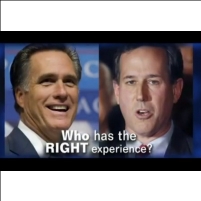Campaigns Shift Negative Ads from Candidate Funding to “Independent” Groups to Avoid Backlash
Sunday, May 13, 2012

Candidates who go negative during a political campaign run the risk of a backlash from voters.
But if a so-called independent group can sling your mud for you, then going negative is a much more successful strategy, according to two professors at Dartmouth College.
In their study published by the American Politics Research journal, Deborah Jordan Brooks and Michael Murov say it is better for an independent expenditure committee to pay for negative commercials because voters can’t really identify who’s behind such nastiness. Such groups often have innocuous names like Restore Our Future (pro-Mitt Romney) or the Red White and Blue Fund (pro-Rick Santorum).
“The fact that the public cannot identify the contributors to so many of these groups thus makes it easier for these groups to go on the attack,” Brooks and Murov wrote.
Independent advertising in this year’s presidential campaign has skyrocketed compared to 2008—by 1,600%, according to the Wesleyan Media Project. And more than 85% of these ads have negative messages.
-Noel Brinkerhoff
To Learn More:
Are Independent Attack Ads More Effective Than Candidate Attack Ads? New Research Says Yes (by Lee Drutman, Sunlight Foundation)
Assessing Accountability in a Post-Citizens United Era: The Effects of Attack Ad Sponsorship by Unknown Independent Groups (by Deborah Jordan Brooks and Michael Murov, American Politics Research) (pdf)
Pro-Romney Super PAC Spent More in Florida than McCain’s Entire 2008 Primary Ad Budget (by Noel Brinkerhoff and David Wallechinsky, AllGov)
- Top Stories
- Unusual News
- Where is the Money Going?
- Controversies
- U.S. and the World
- Appointments and Resignations
- Latest News
- Trump to Stop Deportations If…
- Trump Denounces World Series
- What If China Invaded the United States?
- Donald Trump Has a Mental Health Problem and It Has a Name
- Trump Goes on Renaming Frenzy






Comments